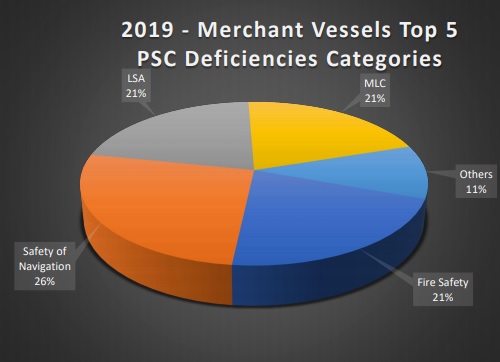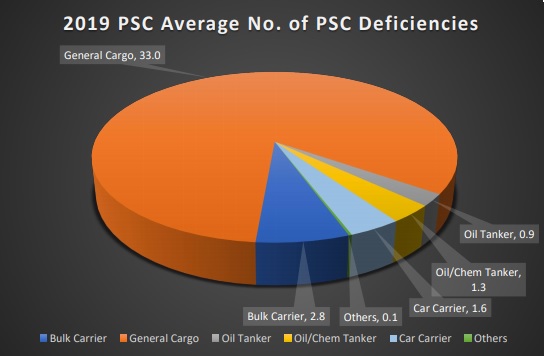As per the IMO Instruments Implementation Code (III Code) a Flag State is encouraged on a periodic basis to evaluate its performance. As such, the Cayman Islands Shipping Registry (CISR) issued its key finding from ship inspections during 2019, providing details of Port State Control (PSC) performance, most common PSC deficiencies for Merchant ships in the fleet and most common deficiencies from Flag State inspections of yachts.
PSC Performance
With the support and shared quality values of our shipowners, ship managers and crew,
CISR has achieved White List, Low Risk status in all the major MoUs on Port State Control, including the USCG Qualship 21 programme, and is ranked as a top performing Flag under the International Chamber of Shipping for the 8th consecutive year.
Over the years CISR flag-in procedures and criteria have been developed, and amended as necessary, to mitigate the risk of registering ships which might negatively impact on our PSC ranking but more importantly to safeguard against unfair treatment of seafarers, and non-compliance with the highest environmental and safety standards.
In the latest Paris MoU Performance List (2019) Cayman Registry is ranked no.12 in the
‘white list’ of 41 Flag States. Notably, in the last 3 years a Red Ensign Group (REG) flag has held the top position; 2017 – Cayman Registry, 2018 – Isle of Man and 2019 – UK MCA.
In the latest Tokyo MoU Performance List (2019) Cayman Registry is ranked no.15 in the ‘white list’ of 40 Flag States.
Flag Performance table
As per the latest Flag State Performance Table (2018/19) Cayman Registry has ‘positive
performance indicators’ in all the monitored areas: PSC, Ratification of major international maritime treaties, the use of Recognised Organisations in compliance with the IMO RO Code, Age of fleet, Reporting Requirements, Attendance at IMO meetings and IMO Member State Audit.
Most Common PSC Deficiencies (Merchant Ships)
The most common PSC deficiencies for CISR flagged merchant ships are in following areas:
- Safety of Navigation
- Life-saving Appliances
- Maritime Labour Convention and
- Fire Safety

It is of interest to the CISR to compare the categories of deficiencies against the main PSC MoU annual reports for all flags to identify whether our fleet is disproportinately nonperforming in a particular category. However, due to relativley small number of CISR registered merchant ships and deficencies raised it is perhaps unhelpful to read too much into statistics.
By way of example, the Paris MoU PSC database filtered for 2019 reports the following as the top 20 deficienies for CISR registered merchant ships. The highest number of
deficiencies were recorded under ‘ISM’ or ‘Fire Fighting Equipment’ but were only 3 in
number.
Furthermore, one non-performing General Cargo ship was subject to 2 PSC detentions in 2019 and the number of deficiencies raised was enough to distort our statistics; as normally we would expect Bulk Carriers to be the highest risk. The non-performing General Cargo ship has since left the CISR.

A process that the CISR has found more effective for our fleet is that if 5 or more
deficiencies are raised during a PSC inspection the Company is required to undertake a
detailed root cause anaylsis and present a corrective action plan (CAP) for acceptance.
Should the CAP prove not to be effective in eliminating PSC deficiencies the vessel’s risk
ranking is increased and additional flag state inspections will be required until the low risk ranking is restored. Furthermore, deficiencies by Company per vessel, are closely monitored in order to spot a developing trend; again a root cause analyis may be requested or an additional Company DOC audit carried out.
The CISR strive to maintain an average fleet age of 12 years in order to help safeguard our PSC ranking; as such so we generally collaborate with Owner’s who have a fleet renewal programme.
CISR Concentrated Inspection Campaign Items 2020
The following items will receive special attention during Flag State inspections in 2020:
- All ship types – Preparation for compliance with EU Ship Recycling Regulations which come into effect 31Dec2020 (CIGN 02/2019 refers)
- All ship types – Preparation for Cyber Risk Management requirements which come
into effect on 1st Jan2021 (CIGN 07/2019 refers) - Yachts – The adequacy of boarding arrangements with respect to protection of
personnel when not certificated to the ISO standard - Yachts – Effective reduced height of guardrails/bulwarks – risk assessment for any
such areas - Yachts – Li-ion battery and Li-ion powered toys – storage and fire-fighting procedures






























































